Investigating Factors in Marriott Hotel's Business Performance
VerifiedAdded on 2022/12/01
|12
|3233
|453
Report
AI Summary
This report investigates the factors that contribute to efficient management and business performance within the accommodation service function, using Marriott Hotel London as a case study. It begins with an introduction to the hospitality industry and the role of room division and operations management. The report then delves into the key sub-departments of room division, including front office (reception, reservation, guest relation, bell desk, and concierge) and housekeeping, detailing their functions and importance. Following this, the report analyzes key legal and statutory regulations impacting hotel operations, such as data protection, noise, health and safety, and fire regulations. Finally, it critically examines yield management and revenue management strategies, discussing their significance in maximizing occupancy and revenue, and analyzing the average daily rate (ADR) and revenue per available room (RevPAR) metrics. The analysis highlights the importance of demand forecasting and strategic pricing in optimizing hotel performance.
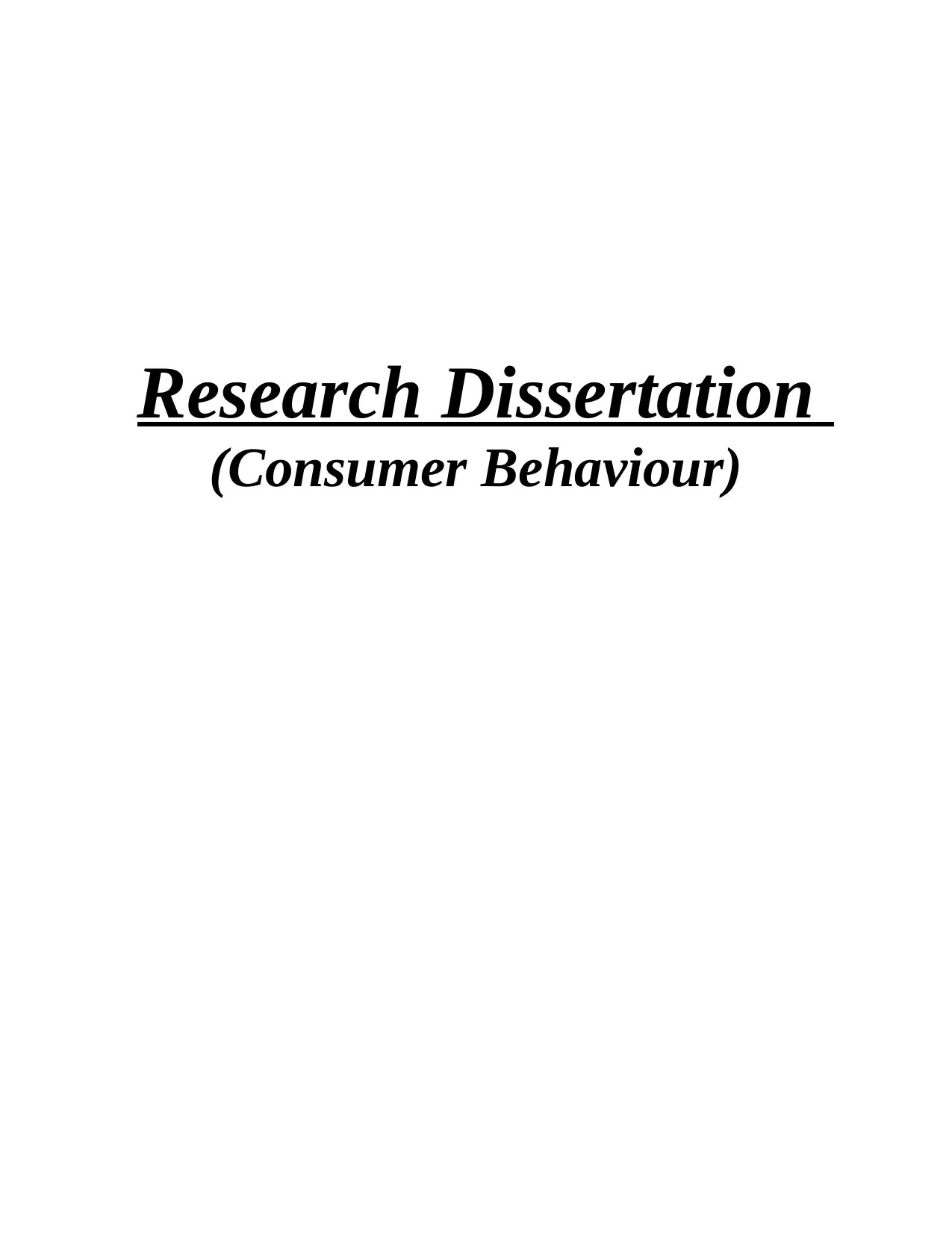
Research Dissertation
(Consumer Behaviour)
(Consumer Behaviour)
Paraphrase This Document
Need a fresh take? Get an instant paraphrase of this document with our AI Paraphraser
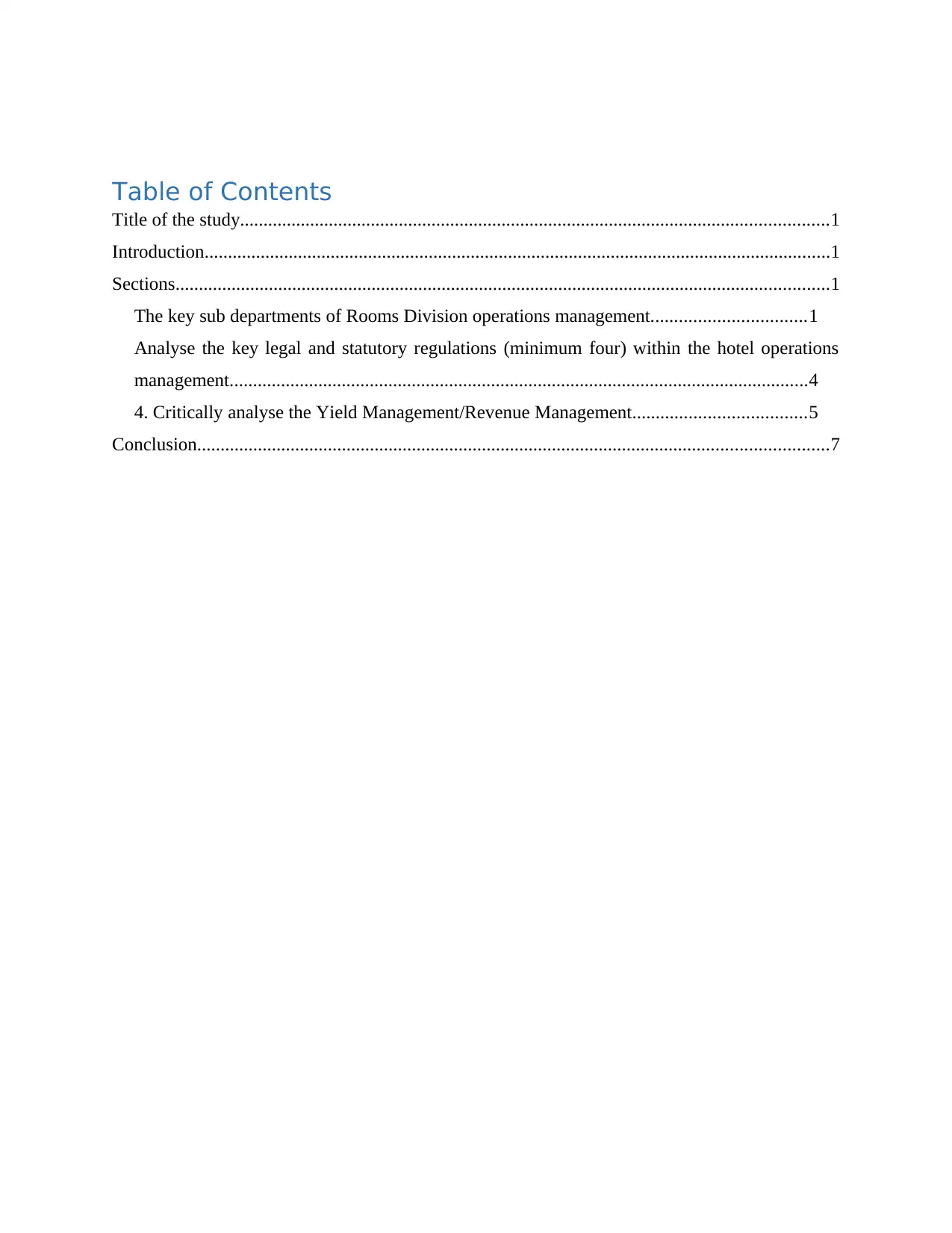
Table of Contents
Title of the study..............................................................................................................................1
Introduction......................................................................................................................................1
Sections............................................................................................................................................1
The key sub departments of Rooms Division operations management.................................1
Analyse the key legal and statutory regulations (minimum four) within the hotel operations
management............................................................................................................................4
4. Critically analyse the Yield Management/Revenue Management.....................................5
Conclusion.......................................................................................................................................7
Title of the study..............................................................................................................................1
Introduction......................................................................................................................................1
Sections............................................................................................................................................1
The key sub departments of Rooms Division operations management.................................1
Analyse the key legal and statutory regulations (minimum four) within the hotel operations
management............................................................................................................................4
4. Critically analyse the Yield Management/Revenue Management.....................................5
Conclusion.......................................................................................................................................7

⊘ This is a preview!⊘
Do you want full access?
Subscribe today to unlock all pages.

Trusted by 1+ million students worldwide
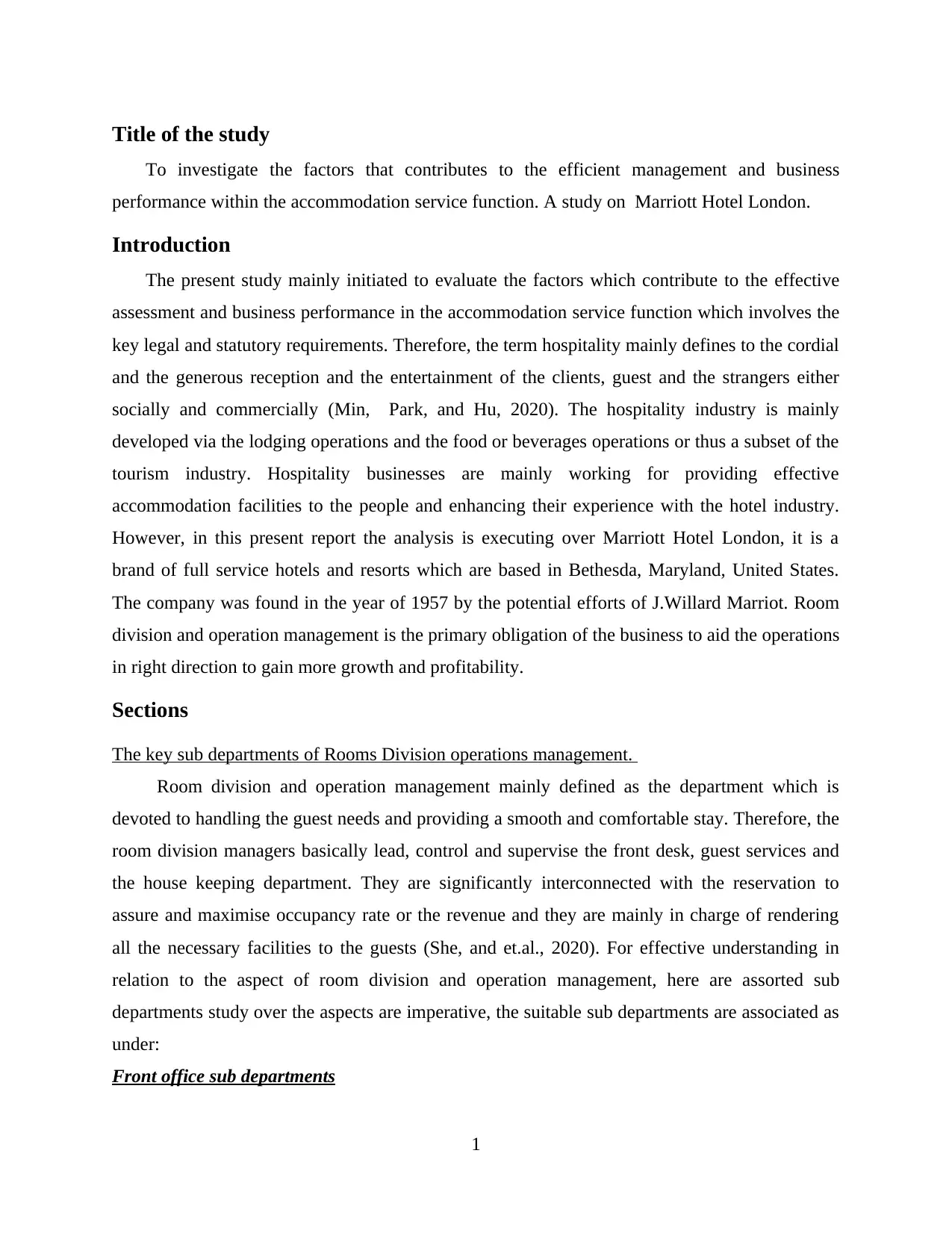
Title of the study
To investigate the factors that contributes to the efficient management and business
performance within the accommodation service function. A study on Marriott Hotel London.
Introduction
The present study mainly initiated to evaluate the factors which contribute to the effective
assessment and business performance in the accommodation service function which involves the
key legal and statutory requirements. Therefore, the term hospitality mainly defines to the cordial
and the generous reception and the entertainment of the clients, guest and the strangers either
socially and commercially (Min, Park, and Hu, 2020). The hospitality industry is mainly
developed via the lodging operations and the food or beverages operations or thus a subset of the
tourism industry. Hospitality businesses are mainly working for providing effective
accommodation facilities to the people and enhancing their experience with the hotel industry.
However, in this present report the analysis is executing over Marriott Hotel London, it is a
brand of full service hotels and resorts which are based in Bethesda, Maryland, United States.
The company was found in the year of 1957 by the potential efforts of J.Willard Marriot. Room
division and operation management is the primary obligation of the business to aid the operations
in right direction to gain more growth and profitability.
Sections
The key sub departments of Rooms Division operations management.
Room division and operation management mainly defined as the department which is
devoted to handling the guest needs and providing a smooth and comfortable stay. Therefore, the
room division managers basically lead, control and supervise the front desk, guest services and
the house keeping department. They are significantly interconnected with the reservation to
assure and maximise occupancy rate or the revenue and they are mainly in charge of rendering
all the necessary facilities to the guests (She, and et.al., 2020). For effective understanding in
relation to the aspect of room division and operation management, here are assorted sub
departments study over the aspects are imperative, the suitable sub departments are associated as
under:
Front office sub departments
1
To investigate the factors that contributes to the efficient management and business
performance within the accommodation service function. A study on Marriott Hotel London.
Introduction
The present study mainly initiated to evaluate the factors which contribute to the effective
assessment and business performance in the accommodation service function which involves the
key legal and statutory requirements. Therefore, the term hospitality mainly defines to the cordial
and the generous reception and the entertainment of the clients, guest and the strangers either
socially and commercially (Min, Park, and Hu, 2020). The hospitality industry is mainly
developed via the lodging operations and the food or beverages operations or thus a subset of the
tourism industry. Hospitality businesses are mainly working for providing effective
accommodation facilities to the people and enhancing their experience with the hotel industry.
However, in this present report the analysis is executing over Marriott Hotel London, it is a
brand of full service hotels and resorts which are based in Bethesda, Maryland, United States.
The company was found in the year of 1957 by the potential efforts of J.Willard Marriot. Room
division and operation management is the primary obligation of the business to aid the operations
in right direction to gain more growth and profitability.
Sections
The key sub departments of Rooms Division operations management.
Room division and operation management mainly defined as the department which is
devoted to handling the guest needs and providing a smooth and comfortable stay. Therefore, the
room division managers basically lead, control and supervise the front desk, guest services and
the house keeping department. They are significantly interconnected with the reservation to
assure and maximise occupancy rate or the revenue and they are mainly in charge of rendering
all the necessary facilities to the guests (She, and et.al., 2020). For effective understanding in
relation to the aspect of room division and operation management, here are assorted sub
departments study over the aspects are imperative, the suitable sub departments are associated as
under:
Front office sub departments
1
Paraphrase This Document
Need a fresh take? Get an instant paraphrase of this document with our AI Paraphraser
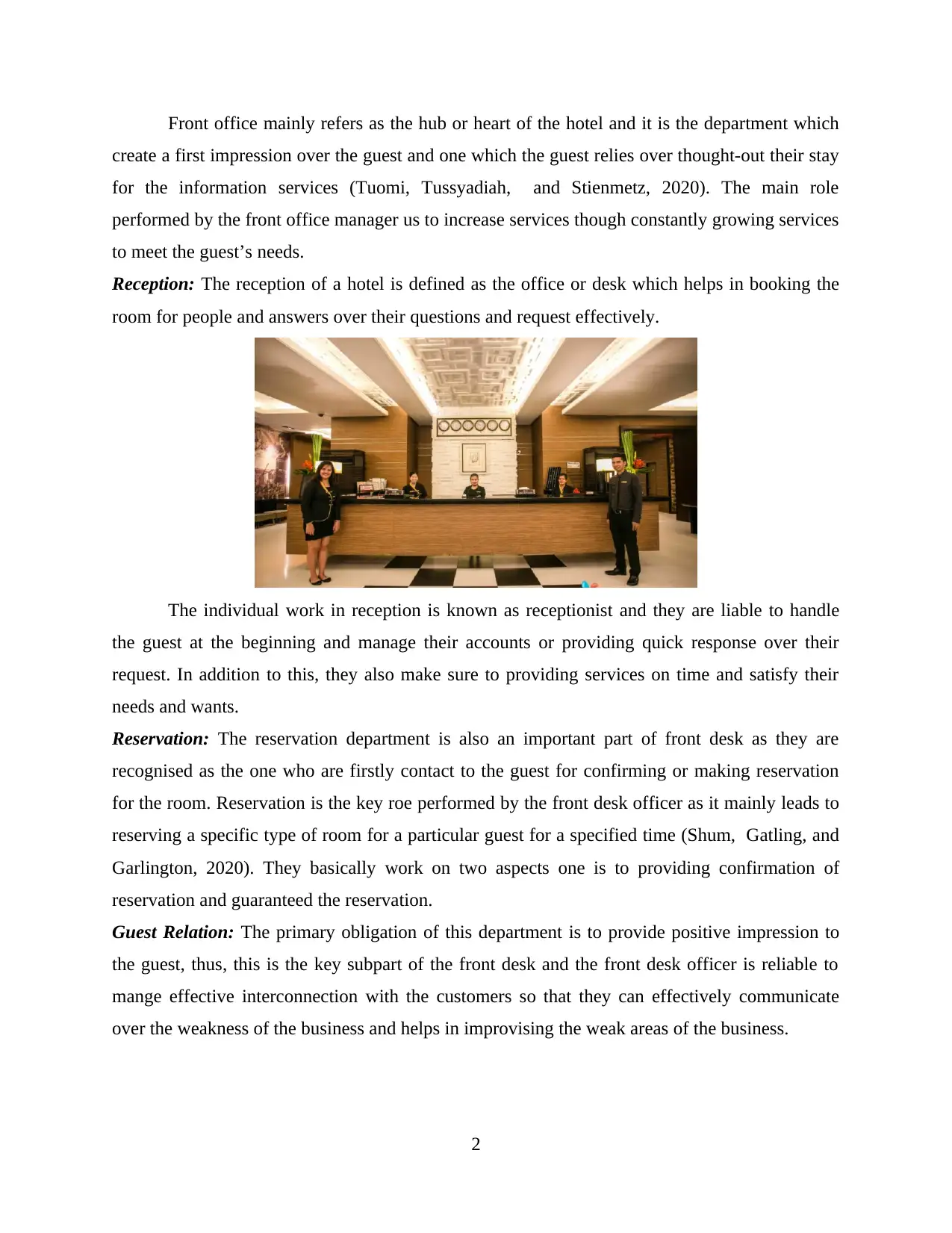
Front office mainly refers as the hub or heart of the hotel and it is the department which
create a first impression over the guest and one which the guest relies over thought-out their stay
for the information services (Tuomi, Tussyadiah, and Stienmetz, 2020). The main role
performed by the front office manager us to increase services though constantly growing services
to meet the guest’s needs.
Reception: The reception of a hotel is defined as the office or desk which helps in booking the
room for people and answers over their questions and request effectively.
The individual work in reception is known as receptionist and they are liable to handle
the guest at the beginning and manage their accounts or providing quick response over their
request. In addition to this, they also make sure to providing services on time and satisfy their
needs and wants.
Reservation: The reservation department is also an important part of front desk as they are
recognised as the one who are firstly contact to the guest for confirming or making reservation
for the room. Reservation is the key roe performed by the front desk officer as it mainly leads to
reserving a specific type of room for a particular guest for a specified time (Shum, Gatling, and
Garlington, 2020). They basically work on two aspects one is to providing confirmation of
reservation and guaranteed the reservation.
Guest Relation: The primary obligation of this department is to provide positive impression to
the guest, thus, this is the key subpart of the front desk and the front desk officer is reliable to
mange effective interconnection with the customers so that they can effectively communicate
over the weakness of the business and helps in improvising the weak areas of the business.
2
create a first impression over the guest and one which the guest relies over thought-out their stay
for the information services (Tuomi, Tussyadiah, and Stienmetz, 2020). The main role
performed by the front office manager us to increase services though constantly growing services
to meet the guest’s needs.
Reception: The reception of a hotel is defined as the office or desk which helps in booking the
room for people and answers over their questions and request effectively.
The individual work in reception is known as receptionist and they are liable to handle
the guest at the beginning and manage their accounts or providing quick response over their
request. In addition to this, they also make sure to providing services on time and satisfy their
needs and wants.
Reservation: The reservation department is also an important part of front desk as they are
recognised as the one who are firstly contact to the guest for confirming or making reservation
for the room. Reservation is the key roe performed by the front desk officer as it mainly leads to
reserving a specific type of room for a particular guest for a specified time (Shum, Gatling, and
Garlington, 2020). They basically work on two aspects one is to providing confirmation of
reservation and guaranteed the reservation.
Guest Relation: The primary obligation of this department is to provide positive impression to
the guest, thus, this is the key subpart of the front desk and the front desk officer is reliable to
mange effective interconnection with the customers so that they can effectively communicate
over the weakness of the business and helps in improvising the weak areas of the business.
2
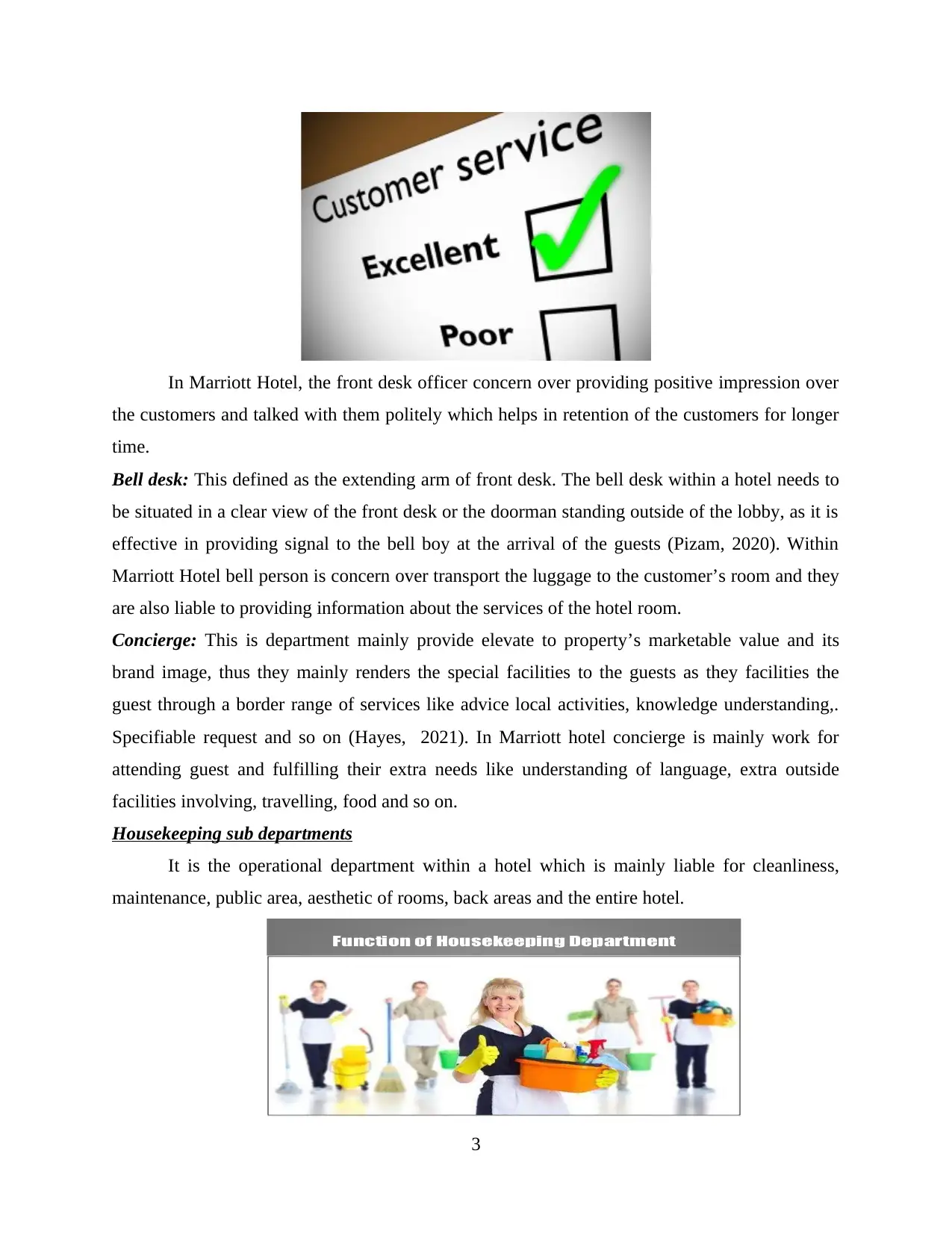
In Marriott Hotel, the front desk officer concern over providing positive impression over
the customers and talked with them politely which helps in retention of the customers for longer
time.
Bell desk: This defined as the extending arm of front desk. The bell desk within a hotel needs to
be situated in a clear view of the front desk or the doorman standing outside of the lobby, as it is
effective in providing signal to the bell boy at the arrival of the guests (Pizam, 2020). Within
Marriott Hotel bell person is concern over transport the luggage to the customer’s room and they
are also liable to providing information about the services of the hotel room.
Concierge: This is department mainly provide elevate to property’s marketable value and its
brand image, thus they mainly renders the special facilities to the guests as they facilities the
guest through a border range of services like advice local activities, knowledge understanding,.
Specifiable request and so on (Hayes, 2021). In Marriott hotel concierge is mainly work for
attending guest and fulfilling their extra needs like understanding of language, extra outside
facilities involving, travelling, food and so on.
Housekeeping sub departments
It is the operational department within a hotel which is mainly liable for cleanliness,
maintenance, public area, aesthetic of rooms, back areas and the entire hotel.
3
the customers and talked with them politely which helps in retention of the customers for longer
time.
Bell desk: This defined as the extending arm of front desk. The bell desk within a hotel needs to
be situated in a clear view of the front desk or the doorman standing outside of the lobby, as it is
effective in providing signal to the bell boy at the arrival of the guests (Pizam, 2020). Within
Marriott Hotel bell person is concern over transport the luggage to the customer’s room and they
are also liable to providing information about the services of the hotel room.
Concierge: This is department mainly provide elevate to property’s marketable value and its
brand image, thus they mainly renders the special facilities to the guests as they facilities the
guest through a border range of services like advice local activities, knowledge understanding,.
Specifiable request and so on (Hayes, 2021). In Marriott hotel concierge is mainly work for
attending guest and fulfilling their extra needs like understanding of language, extra outside
facilities involving, travelling, food and so on.
Housekeeping sub departments
It is the operational department within a hotel which is mainly liable for cleanliness,
maintenance, public area, aesthetic of rooms, back areas and the entire hotel.
3
⊘ This is a preview!⊘
Do you want full access?
Subscribe today to unlock all pages.

Trusted by 1+ million students worldwide
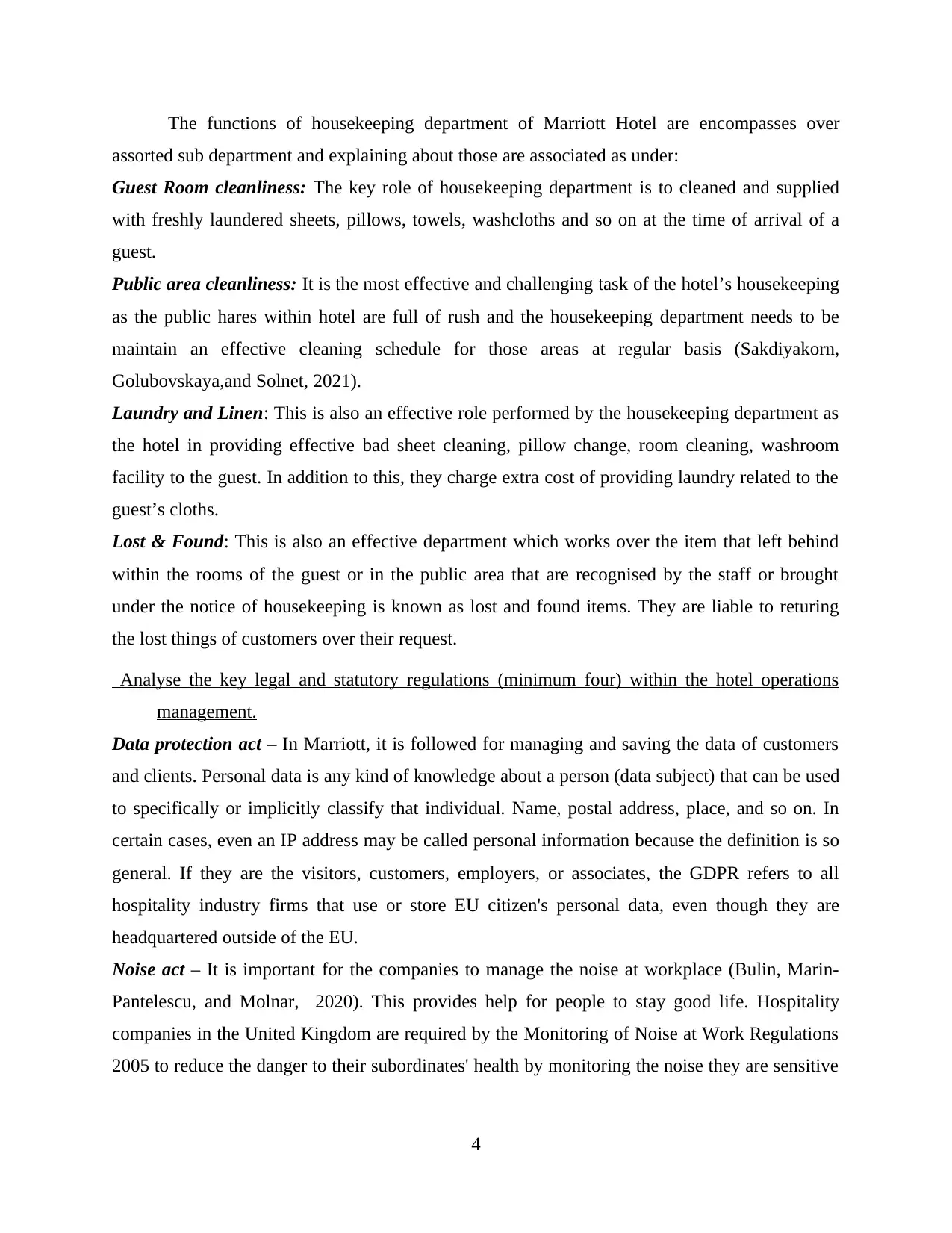
The functions of housekeeping department of Marriott Hotel are encompasses over
assorted sub department and explaining about those are associated as under:
Guest Room cleanliness: The key role of housekeeping department is to cleaned and supplied
with freshly laundered sheets, pillows, towels, washcloths and so on at the time of arrival of a
guest.
Public area cleanliness: It is the most effective and challenging task of the hotel’s housekeeping
as the public hares within hotel are full of rush and the housekeeping department needs to be
maintain an effective cleaning schedule for those areas at regular basis (Sakdiyakorn,
Golubovskaya,and Solnet, 2021).
Laundry and Linen: This is also an effective role performed by the housekeeping department as
the hotel in providing effective bad sheet cleaning, pillow change, room cleaning, washroom
facility to the guest. In addition to this, they charge extra cost of providing laundry related to the
guest’s cloths.
Lost & Found: This is also an effective department which works over the item that left behind
within the rooms of the guest or in the public area that are recognised by the staff or brought
under the notice of housekeeping is known as lost and found items. They are liable to returing
the lost things of customers over their request.
Analyse the key legal and statutory regulations (minimum four) within the hotel operations
management.
Data protection act – In Marriott, it is followed for managing and saving the data of customers
and clients. Personal data is any kind of knowledge about a person (data subject) that can be used
to specifically or implicitly classify that individual. Name, postal address, place, and so on. In
certain cases, even an IP address may be called personal information because the definition is so
general. If they are the visitors, customers, employers, or associates, the GDPR refers to all
hospitality industry firms that use or store EU citizen's personal data, even though they are
headquartered outside of the EU.
Noise act – It is important for the companies to manage the noise at workplace (Bulin, Marin-
Pantelescu, and Molnar, 2020). This provides help for people to stay good life. Hospitality
companies in the United Kingdom are required by the Monitoring of Noise at Work Regulations
2005 to reduce the danger to their subordinates' health by monitoring the noise they are sensitive
4
assorted sub department and explaining about those are associated as under:
Guest Room cleanliness: The key role of housekeeping department is to cleaned and supplied
with freshly laundered sheets, pillows, towels, washcloths and so on at the time of arrival of a
guest.
Public area cleanliness: It is the most effective and challenging task of the hotel’s housekeeping
as the public hares within hotel are full of rush and the housekeeping department needs to be
maintain an effective cleaning schedule for those areas at regular basis (Sakdiyakorn,
Golubovskaya,and Solnet, 2021).
Laundry and Linen: This is also an effective role performed by the housekeeping department as
the hotel in providing effective bad sheet cleaning, pillow change, room cleaning, washroom
facility to the guest. In addition to this, they charge extra cost of providing laundry related to the
guest’s cloths.
Lost & Found: This is also an effective department which works over the item that left behind
within the rooms of the guest or in the public area that are recognised by the staff or brought
under the notice of housekeeping is known as lost and found items. They are liable to returing
the lost things of customers over their request.
Analyse the key legal and statutory regulations (minimum four) within the hotel operations
management.
Data protection act – In Marriott, it is followed for managing and saving the data of customers
and clients. Personal data is any kind of knowledge about a person (data subject) that can be used
to specifically or implicitly classify that individual. Name, postal address, place, and so on. In
certain cases, even an IP address may be called personal information because the definition is so
general. If they are the visitors, customers, employers, or associates, the GDPR refers to all
hospitality industry firms that use or store EU citizen's personal data, even though they are
headquartered outside of the EU.
Noise act – It is important for the companies to manage the noise at workplace (Bulin, Marin-
Pantelescu, and Molnar, 2020). This provides help for people to stay good life. Hospitality
companies in the United Kingdom are required by the Monitoring of Noise at Work Regulations
2005 to reduce the danger to their subordinates' health by monitoring the noise they are sensitive
4
Paraphrase This Document
Need a fresh take? Get an instant paraphrase of this document with our AI Paraphraser
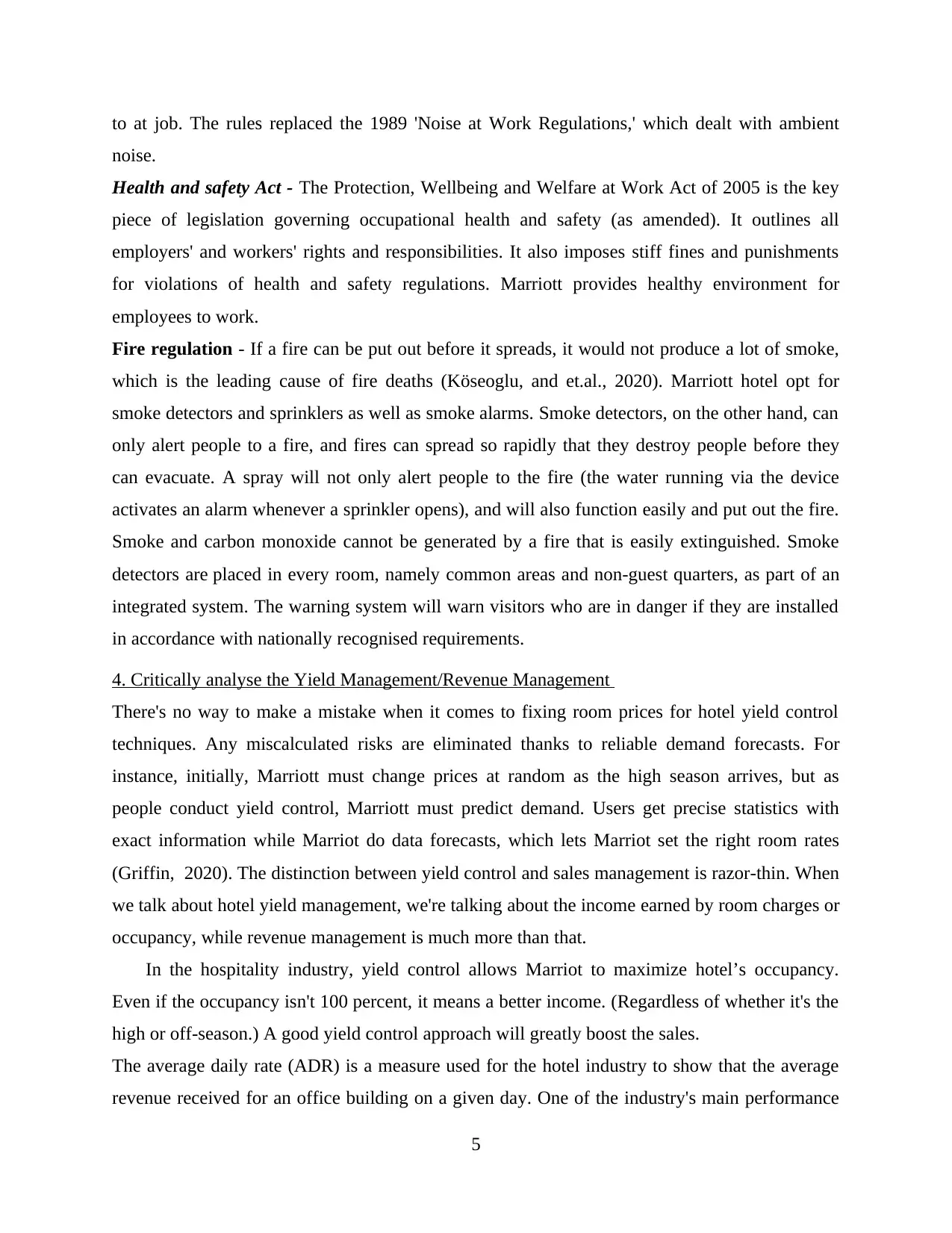
to at job. The rules replaced the 1989 'Noise at Work Regulations,' which dealt with ambient
noise.
Health and safety Act - The Protection, Wellbeing and Welfare at Work Act of 2005 is the key
piece of legislation governing occupational health and safety (as amended). It outlines all
employers' and workers' rights and responsibilities. It also imposes stiff fines and punishments
for violations of health and safety regulations. Marriott provides healthy environment for
employees to work.
Fire regulation - If a fire can be put out before it spreads, it would not produce a lot of smoke,
which is the leading cause of fire deaths (Köseoglu, and et.al., 2020). Marriott hotel opt for
smoke detectors and sprinklers as well as smoke alarms. Smoke detectors, on the other hand, can
only alert people to a fire, and fires can spread so rapidly that they destroy people before they
can evacuate. A spray will not only alert people to the fire (the water running via the device
activates an alarm whenever a sprinkler opens), and will also function easily and put out the fire.
Smoke and carbon monoxide cannot be generated by a fire that is easily extinguished. Smoke
detectors are placed in every room, namely common areas and non-guest quarters, as part of an
integrated system. The warning system will warn visitors who are in danger if they are installed
in accordance with nationally recognised requirements.
4. Critically analyse the Yield Management/Revenue Management
There's no way to make a mistake when it comes to fixing room prices for hotel yield control
techniques. Any miscalculated risks are eliminated thanks to reliable demand forecasts. For
instance, initially, Marriott must change prices at random as the high season arrives, but as
people conduct yield control, Marriott must predict demand. Users get precise statistics with
exact information while Marriot do data forecasts, which lets Marriot set the right room rates
(Griffin, 2020). The distinction between yield control and sales management is razor-thin. When
we talk about hotel yield management, we're talking about the income earned by room charges or
occupancy, while revenue management is much more than that.
In the hospitality industry, yield control allows Marriot to maximize hotel’s occupancy.
Even if the occupancy isn't 100 percent, it means a better income. (Regardless of whether it's the
high or off-season.) A good yield control approach will greatly boost the sales.
The average daily rate (ADR) is a measure used for the hotel industry to show that the average
revenue received for an office building on a given day. One of the industry's main performance
5
noise.
Health and safety Act - The Protection, Wellbeing and Welfare at Work Act of 2005 is the key
piece of legislation governing occupational health and safety (as amended). It outlines all
employers' and workers' rights and responsibilities. It also imposes stiff fines and punishments
for violations of health and safety regulations. Marriott provides healthy environment for
employees to work.
Fire regulation - If a fire can be put out before it spreads, it would not produce a lot of smoke,
which is the leading cause of fire deaths (Köseoglu, and et.al., 2020). Marriott hotel opt for
smoke detectors and sprinklers as well as smoke alarms. Smoke detectors, on the other hand, can
only alert people to a fire, and fires can spread so rapidly that they destroy people before they
can evacuate. A spray will not only alert people to the fire (the water running via the device
activates an alarm whenever a sprinkler opens), and will also function easily and put out the fire.
Smoke and carbon monoxide cannot be generated by a fire that is easily extinguished. Smoke
detectors are placed in every room, namely common areas and non-guest quarters, as part of an
integrated system. The warning system will warn visitors who are in danger if they are installed
in accordance with nationally recognised requirements.
4. Critically analyse the Yield Management/Revenue Management
There's no way to make a mistake when it comes to fixing room prices for hotel yield control
techniques. Any miscalculated risks are eliminated thanks to reliable demand forecasts. For
instance, initially, Marriott must change prices at random as the high season arrives, but as
people conduct yield control, Marriott must predict demand. Users get precise statistics with
exact information while Marriot do data forecasts, which lets Marriot set the right room rates
(Griffin, 2020). The distinction between yield control and sales management is razor-thin. When
we talk about hotel yield management, we're talking about the income earned by room charges or
occupancy, while revenue management is much more than that.
In the hospitality industry, yield control allows Marriot to maximize hotel’s occupancy.
Even if the occupancy isn't 100 percent, it means a better income. (Regardless of whether it's the
high or off-season.) A good yield control approach will greatly boost the sales.
The average daily rate (ADR) is a measure used for the hotel industry to show that the average
revenue received for an office building on a given day. One of the industry's main performance
5
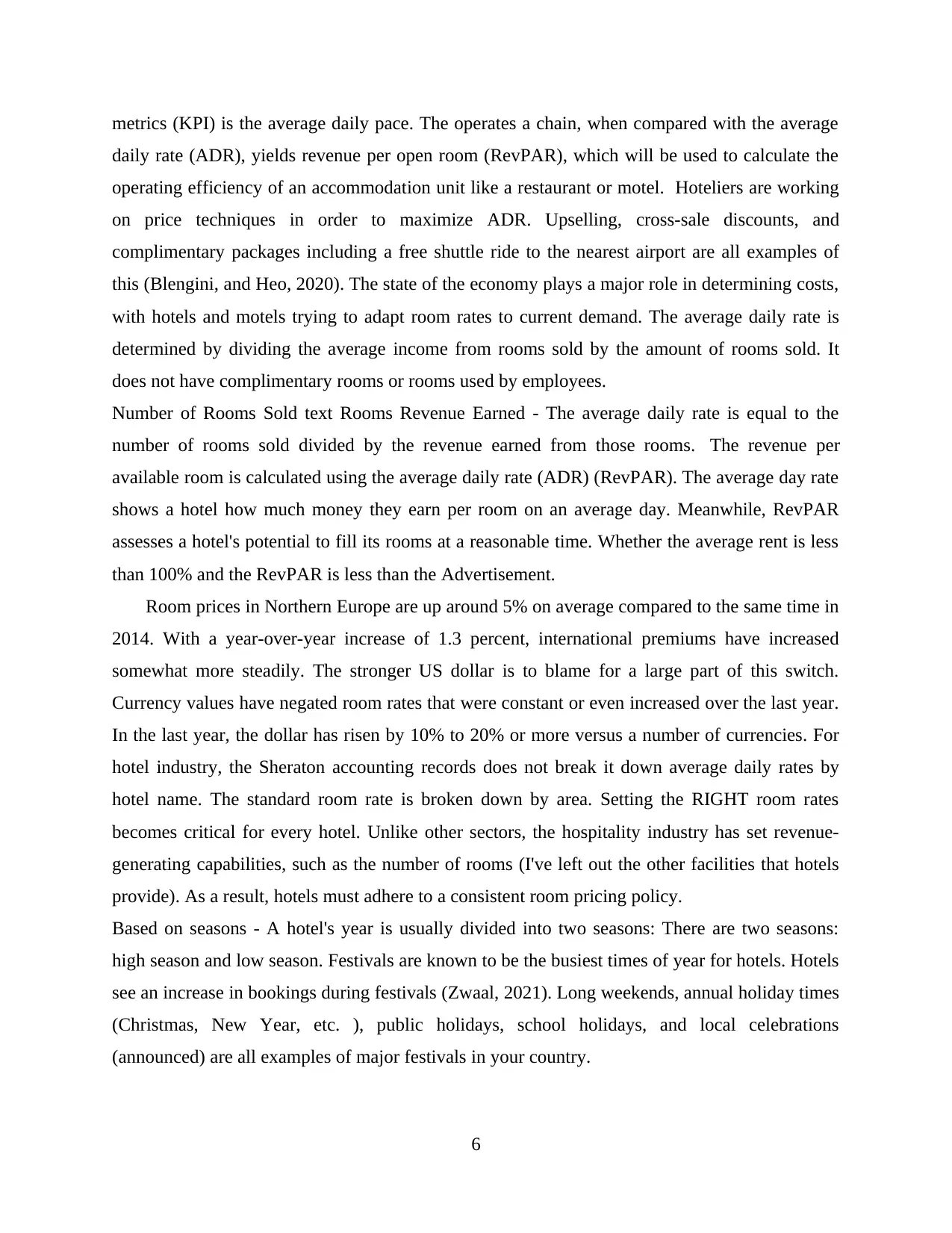
metrics (KPI) is the average daily pace. The operates a chain, when compared with the average
daily rate (ADR), yields revenue per open room (RevPAR), which will be used to calculate the
operating efficiency of an accommodation unit like a restaurant or motel. Hoteliers are working
on price techniques in order to maximize ADR. Upselling, cross-sale discounts, and
complimentary packages including a free shuttle ride to the nearest airport are all examples of
this (Blengini, and Heo, 2020). The state of the economy plays a major role in determining costs,
with hotels and motels trying to adapt room rates to current demand. The average daily rate is
determined by dividing the average income from rooms sold by the amount of rooms sold. It
does not have complimentary rooms or rooms used by employees.
Number of Rooms Sold text Rooms Revenue Earned - The average daily rate is equal to the
number of rooms sold divided by the revenue earned from those rooms. The revenue per
available room is calculated using the average daily rate (ADR) (RevPAR). The average day rate
shows a hotel how much money they earn per room on an average day. Meanwhile, RevPAR
assesses a hotel's potential to fill its rooms at a reasonable time. Whether the average rent is less
than 100% and the RevPAR is less than the Advertisement.
Room prices in Northern Europe are up around 5% on average compared to the same time in
2014. With a year-over-year increase of 1.3 percent, international premiums have increased
somewhat more steadily. The stronger US dollar is to blame for a large part of this switch.
Currency values have negated room rates that were constant or even increased over the last year.
In the last year, the dollar has risen by 10% to 20% or more versus a number of currencies. For
hotel industry, the Sheraton accounting records does not break it down average daily rates by
hotel name. The standard room rate is broken down by area. Setting the RIGHT room rates
becomes critical for every hotel. Unlike other sectors, the hospitality industry has set revenue-
generating capabilities, such as the number of rooms (I've left out the other facilities that hotels
provide). As a result, hotels must adhere to a consistent room pricing policy.
Based on seasons - A hotel's year is usually divided into two seasons: There are two seasons:
high season and low season. Festivals are known to be the busiest times of year for hotels. Hotels
see an increase in bookings during festivals (Zwaal, 2021). Long weekends, annual holiday times
(Christmas, New Year, etc. ), public holidays, school holidays, and local celebrations
(announced) are all examples of major festivals in your country.
6
daily rate (ADR), yields revenue per open room (RevPAR), which will be used to calculate the
operating efficiency of an accommodation unit like a restaurant or motel. Hoteliers are working
on price techniques in order to maximize ADR. Upselling, cross-sale discounts, and
complimentary packages including a free shuttle ride to the nearest airport are all examples of
this (Blengini, and Heo, 2020). The state of the economy plays a major role in determining costs,
with hotels and motels trying to adapt room rates to current demand. The average daily rate is
determined by dividing the average income from rooms sold by the amount of rooms sold. It
does not have complimentary rooms or rooms used by employees.
Number of Rooms Sold text Rooms Revenue Earned - The average daily rate is equal to the
number of rooms sold divided by the revenue earned from those rooms. The revenue per
available room is calculated using the average daily rate (ADR) (RevPAR). The average day rate
shows a hotel how much money they earn per room on an average day. Meanwhile, RevPAR
assesses a hotel's potential to fill its rooms at a reasonable time. Whether the average rent is less
than 100% and the RevPAR is less than the Advertisement.
Room prices in Northern Europe are up around 5% on average compared to the same time in
2014. With a year-over-year increase of 1.3 percent, international premiums have increased
somewhat more steadily. The stronger US dollar is to blame for a large part of this switch.
Currency values have negated room rates that were constant or even increased over the last year.
In the last year, the dollar has risen by 10% to 20% or more versus a number of currencies. For
hotel industry, the Sheraton accounting records does not break it down average daily rates by
hotel name. The standard room rate is broken down by area. Setting the RIGHT room rates
becomes critical for every hotel. Unlike other sectors, the hospitality industry has set revenue-
generating capabilities, such as the number of rooms (I've left out the other facilities that hotels
provide). As a result, hotels must adhere to a consistent room pricing policy.
Based on seasons - A hotel's year is usually divided into two seasons: There are two seasons:
high season and low season. Festivals are known to be the busiest times of year for hotels. Hotels
see an increase in bookings during festivals (Zwaal, 2021). Long weekends, annual holiday times
(Christmas, New Year, etc. ), public holidays, school holidays, and local celebrations
(announced) are all examples of major festivals in your country.
6
⊘ This is a preview!⊘
Do you want full access?
Subscribe today to unlock all pages.

Trusted by 1+ million students worldwide
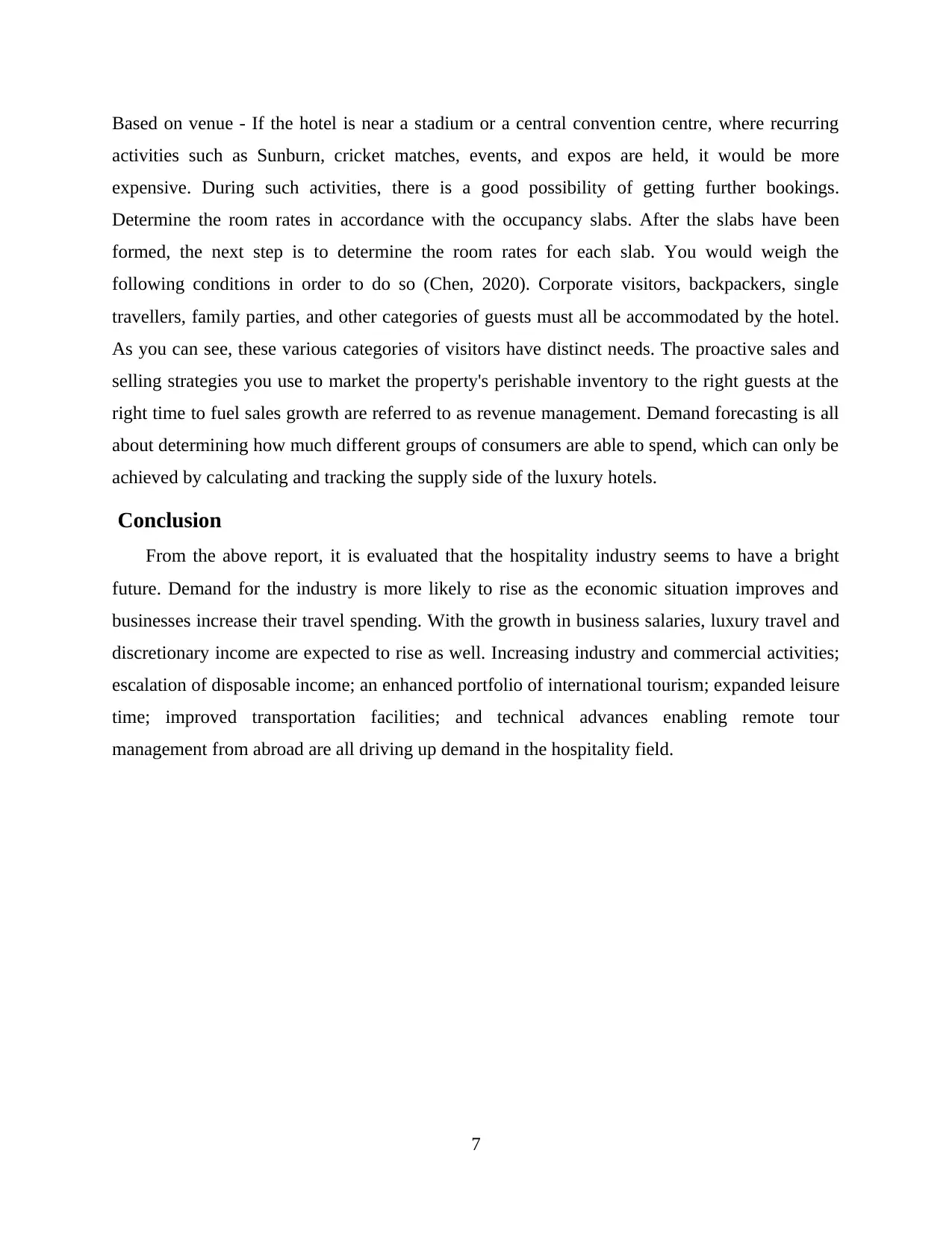
Based on venue - If the hotel is near a stadium or a central convention centre, where recurring
activities such as Sunburn, cricket matches, events, and expos are held, it would be more
expensive. During such activities, there is a good possibility of getting further bookings.
Determine the room rates in accordance with the occupancy slabs. After the slabs have been
formed, the next step is to determine the room rates for each slab. You would weigh the
following conditions in order to do so (Chen, 2020). Corporate visitors, backpackers, single
travellers, family parties, and other categories of guests must all be accommodated by the hotel.
As you can see, these various categories of visitors have distinct needs. The proactive sales and
selling strategies you use to market the property's perishable inventory to the right guests at the
right time to fuel sales growth are referred to as revenue management. Demand forecasting is all
about determining how much different groups of consumers are able to spend, which can only be
achieved by calculating and tracking the supply side of the luxury hotels.
Conclusion
From the above report, it is evaluated that the hospitality industry seems to have a bright
future. Demand for the industry is more likely to rise as the economic situation improves and
businesses increase their travel spending. With the growth in business salaries, luxury travel and
discretionary income are expected to rise as well. Increasing industry and commercial activities;
escalation of disposable income; an enhanced portfolio of international tourism; expanded leisure
time; improved transportation facilities; and technical advances enabling remote tour
management from abroad are all driving up demand in the hospitality field.
7
activities such as Sunburn, cricket matches, events, and expos are held, it would be more
expensive. During such activities, there is a good possibility of getting further bookings.
Determine the room rates in accordance with the occupancy slabs. After the slabs have been
formed, the next step is to determine the room rates for each slab. You would weigh the
following conditions in order to do so (Chen, 2020). Corporate visitors, backpackers, single
travellers, family parties, and other categories of guests must all be accommodated by the hotel.
As you can see, these various categories of visitors have distinct needs. The proactive sales and
selling strategies you use to market the property's perishable inventory to the right guests at the
right time to fuel sales growth are referred to as revenue management. Demand forecasting is all
about determining how much different groups of consumers are able to spend, which can only be
achieved by calculating and tracking the supply side of the luxury hotels.
Conclusion
From the above report, it is evaluated that the hospitality industry seems to have a bright
future. Demand for the industry is more likely to rise as the economic situation improves and
businesses increase their travel spending. With the growth in business salaries, luxury travel and
discretionary income are expected to rise as well. Increasing industry and commercial activities;
escalation of disposable income; an enhanced portfolio of international tourism; expanded leisure
time; improved transportation facilities; and technical advances enabling remote tour
management from abroad are all driving up demand in the hospitality field.
7
Paraphrase This Document
Need a fresh take? Get an instant paraphrase of this document with our AI Paraphraser
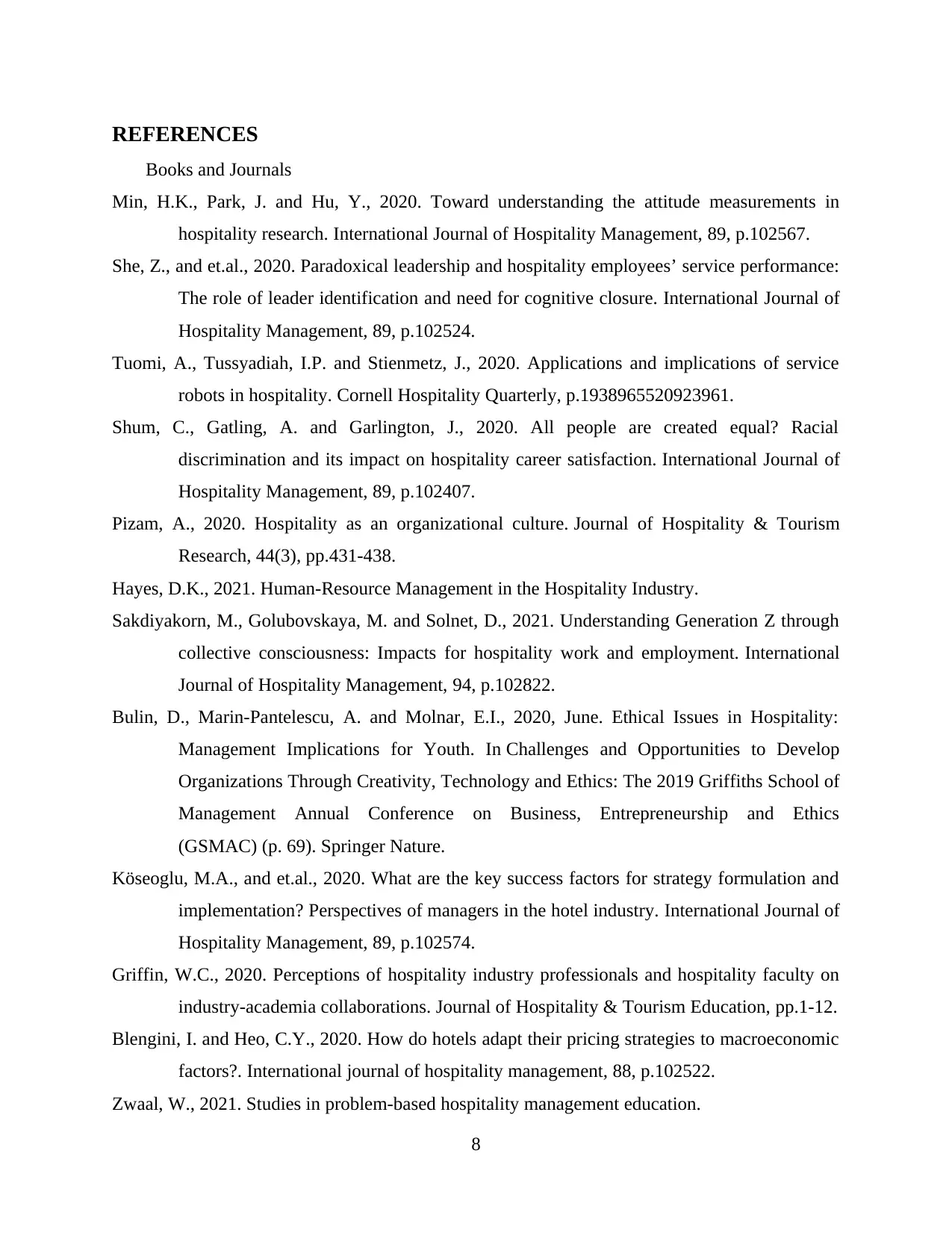
REFERENCES
Books and Journals
Min, H.K., Park, J. and Hu, Y., 2020. Toward understanding the attitude measurements in
hospitality research. International Journal of Hospitality Management, 89, p.102567.
She, Z., and et.al., 2020. Paradoxical leadership and hospitality employees’ service performance:
The role of leader identification and need for cognitive closure. International Journal of
Hospitality Management, 89, p.102524.
Tuomi, A., Tussyadiah, I.P. and Stienmetz, J., 2020. Applications and implications of service
robots in hospitality. Cornell Hospitality Quarterly, p.1938965520923961.
Shum, C., Gatling, A. and Garlington, J., 2020. All people are created equal? Racial
discrimination and its impact on hospitality career satisfaction. International Journal of
Hospitality Management, 89, p.102407.
Pizam, A., 2020. Hospitality as an organizational culture. Journal of Hospitality & Tourism
Research, 44(3), pp.431-438.
Hayes, D.K., 2021. Human-Resource Management in the Hospitality Industry.
Sakdiyakorn, M., Golubovskaya, M. and Solnet, D., 2021. Understanding Generation Z through
collective consciousness: Impacts for hospitality work and employment. International
Journal of Hospitality Management, 94, p.102822.
Bulin, D., Marin-Pantelescu, A. and Molnar, E.I., 2020, June. Ethical Issues in Hospitality:
Management Implications for Youth. In Challenges and Opportunities to Develop
Organizations Through Creativity, Technology and Ethics: The 2019 Griffiths School of
Management Annual Conference on Business, Entrepreneurship and Ethics
(GSMAC) (p. 69). Springer Nature.
Köseoglu, M.A., and et.al., 2020. What are the key success factors for strategy formulation and
implementation? Perspectives of managers in the hotel industry. International Journal of
Hospitality Management, 89, p.102574.
Griffin, W.C., 2020. Perceptions of hospitality industry professionals and hospitality faculty on
industry-academia collaborations. Journal of Hospitality & Tourism Education, pp.1-12.
Blengini, I. and Heo, C.Y., 2020. How do hotels adapt their pricing strategies to macroeconomic
factors?. International journal of hospitality management, 88, p.102522.
Zwaal, W., 2021. Studies in problem-based hospitality management education.
8
Books and Journals
Min, H.K., Park, J. and Hu, Y., 2020. Toward understanding the attitude measurements in
hospitality research. International Journal of Hospitality Management, 89, p.102567.
She, Z., and et.al., 2020. Paradoxical leadership and hospitality employees’ service performance:
The role of leader identification and need for cognitive closure. International Journal of
Hospitality Management, 89, p.102524.
Tuomi, A., Tussyadiah, I.P. and Stienmetz, J., 2020. Applications and implications of service
robots in hospitality. Cornell Hospitality Quarterly, p.1938965520923961.
Shum, C., Gatling, A. and Garlington, J., 2020. All people are created equal? Racial
discrimination and its impact on hospitality career satisfaction. International Journal of
Hospitality Management, 89, p.102407.
Pizam, A., 2020. Hospitality as an organizational culture. Journal of Hospitality & Tourism
Research, 44(3), pp.431-438.
Hayes, D.K., 2021. Human-Resource Management in the Hospitality Industry.
Sakdiyakorn, M., Golubovskaya, M. and Solnet, D., 2021. Understanding Generation Z through
collective consciousness: Impacts for hospitality work and employment. International
Journal of Hospitality Management, 94, p.102822.
Bulin, D., Marin-Pantelescu, A. and Molnar, E.I., 2020, June. Ethical Issues in Hospitality:
Management Implications for Youth. In Challenges and Opportunities to Develop
Organizations Through Creativity, Technology and Ethics: The 2019 Griffiths School of
Management Annual Conference on Business, Entrepreneurship and Ethics
(GSMAC) (p. 69). Springer Nature.
Köseoglu, M.A., and et.al., 2020. What are the key success factors for strategy formulation and
implementation? Perspectives of managers in the hotel industry. International Journal of
Hospitality Management, 89, p.102574.
Griffin, W.C., 2020. Perceptions of hospitality industry professionals and hospitality faculty on
industry-academia collaborations. Journal of Hospitality & Tourism Education, pp.1-12.
Blengini, I. and Heo, C.Y., 2020. How do hotels adapt their pricing strategies to macroeconomic
factors?. International journal of hospitality management, 88, p.102522.
Zwaal, W., 2021. Studies in problem-based hospitality management education.
8
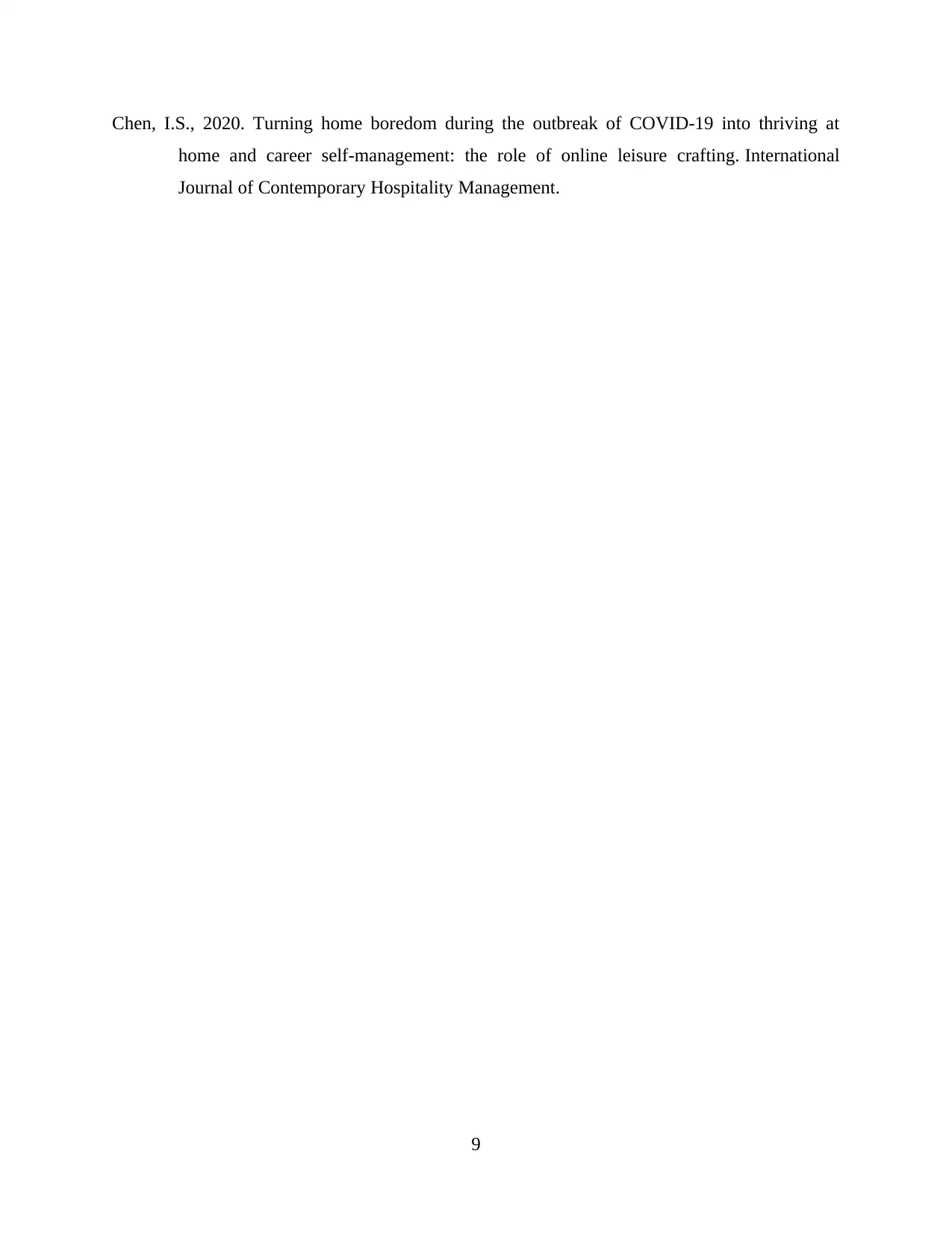
Chen, I.S., 2020. Turning home boredom during the outbreak of COVID-19 into thriving at
home and career self-management: the role of online leisure crafting. International
Journal of Contemporary Hospitality Management.
9
home and career self-management: the role of online leisure crafting. International
Journal of Contemporary Hospitality Management.
9
⊘ This is a preview!⊘
Do you want full access?
Subscribe today to unlock all pages.

Trusted by 1+ million students worldwide
1 out of 12